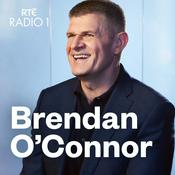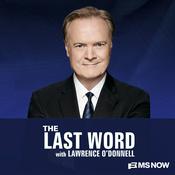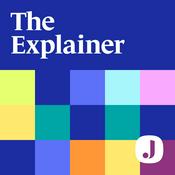180 episodes

An End-of-the-Year Message
20/12/2025 | 2 mins.
Editor Dominic Preziosi updates listeners of The Commonweal Podcast.

Ep. 157 - The Counterweight: MAGA vs. the World
26/9/2025 | 59 mins.
A central tenet of the MAGA movement is the Trump administration's "America First" foreign-policy agenda. To fulfill this agenda, it has slashed foreign aid, launched a trade war with the United States’ most reliable trading partners, and threatened to abandon NATO and our most trusted allies. Informed by Trump’s transactional approach to international relations, such actions flout the existing liberal world order, which has worked to promote democracy, human rights, free trade, and the freedom of movement since the end of World War II. They also betray the very idea of a shared humanity, which is profoundly antithetical to Catholic Social Teaching. On this fourth, and final, episode of "The Counterweight," associate editor Griffin Oleynick speaks with Loyola Chicago's Miguel Diaz, the U.S. ambassador to the Holy See under President Barack Obama, about the Trump administration's foreign policy, Diaz's experiences as a diplomat, and what the “America First” agenda means for the international community—and for the United States. Diaz also discusses how Catholic Social Teaching can counter this agenda by championing foreign policies that recognize the existing liberal order, support human rights, and act in service of the common good. For further reading: Andrew J. Bachevich on Biden's foreign policy William Pfaff on the limits and dangers of American power abroad The Editors on Pacem in Terris

Ep. 156 - The Counterweight: The Common Good & American Liberalism
11/9/2025 | 1h 12 mins.
A little more than eight months into the second Trump presidency, many Americans today find the United States increasingly unrecognizable: a volatile and inflationary economy, rising political violence, and brazen corruption at all levels of government don’t appear to be going away anytime soon. So how did we get here? What lessons can we learn from the histories of other countries, especially ones that experienced radical destabilization and an authoritarian turn? To answer these questions, on this episode we’re speaking with Hille Haker, a professor of Catholic Moral Theology at Loyola University Chicago. A native German, Haker points out how the current situation in the United States evinces disturbing parallels with the rise of Nazism in Germany. She also details the intellectual developments that have given rise to the new right wing anti-democratic comfort with authoritarianism—and how Catholic Social Teaching can counter it. For further reading: Eugene McCarraher on the perils of Christian post-liberalism A Commonweal symposium on the work of Patrick Deneen Philip Jeffery on leaving behind the new right

Ep. 155 - The Counterweight: Against White Christian Nationalism
05/8/2025 | 55 mins.
One of the most prominent features of the second Trump administration has been its bluntly racist actions and policymaking. Recent examples abound, from the suspension of asylum for migrants and refugees, the all-out war on Diversity, Equity, and Inclusion programs in federal agencies and higher education, and the ongoing and increasingly militarized efforts at mass deportation, which have terrorized Latino, Haitian, and other communities across the country. This second episode in our series The Counterweight: Reclaiming Catholic Social Teaching in a Time of Crisis features Fr. Bryan Massingale. He’s a professor in Fordham University’s theology department and a priest of the archdiocese of Milwaukee. He joins Commonweal editor Dominic Preziosi to examine the ideology that in his view undergirds so many of the Trump administration’s actions: white Christian nationalism. Fr. Massingale’s remarks are followed by discussion between him and three other experts, Fordham’s Cristina Traina and Loyola Chicago’s Miguel Diaz and Hille Haker.

Ep. 154 - The Counterweight: Reclaiming Catholic Social Teaching
25/7/2025 | 43 mins.
Since becoming pope, Leo XIV has reminded us that the Catholic Church “offers to everyone the treasury of her social teaching.” That tradition is especially salient now, amid the rise of Christian nationalism and of alternative interpretations of Catholicism among some high-profile politicians in the United States. As we confront the political, social, and spiritual challenges brought on by the second Trump administration, the moment seems right for a clear examination of Catholic social teaching by leading scholarly voices deeply rooted in the Catholic intellectual tradition, especially its ethics, political philosophy, and theology. In this special four-episode series, a collaboration between Commonweal and senior members of the theology departments at Fordham University and Loyola University Chicago, we present four conversations, each providing a provocative, informative analysis of key political and social issues rooted in the understanding of Catholic social teaching. We’re calling it ‘The Counterweight: Reclaiming Catholic Social Teaching in a Time of Crisis.’ Our participants are Christina Traina and Bryan Massingale of Fordham University, and Hille Haker and Miguel Diaz of Loyola University Chicago. Each episode will have a featured presenter, followed by a conversation among all the participants. Today’s episode, our first, takes up the purpose of government, an especially urgent topic given the radical departure from the principles and conventions of liberal democracy by the Trump administration. Fordham’s Christina Traina is here to explain how that departure is also a departure from Catholic social teaching’s more expansive and communal understanding of government—not just as a guarantor of rights, but a steward of the common good.
More News podcasts
Trending News podcasts
About The Commonweal Podcast
Listen to The Commonweal Podcast, The Rest Is Politics: US and many other podcasts from around the world with the radio.net app

Get the free radio.net app
- Stations and podcasts to bookmark
- Stream via Wi-Fi or Bluetooth
- Supports Carplay & Android Auto
- Many other app features
Get the free radio.net app
- Stations and podcasts to bookmark
- Stream via Wi-Fi or Bluetooth
- Supports Carplay & Android Auto
- Many other app features


The Commonweal Podcast
download the app,
start listening.




































